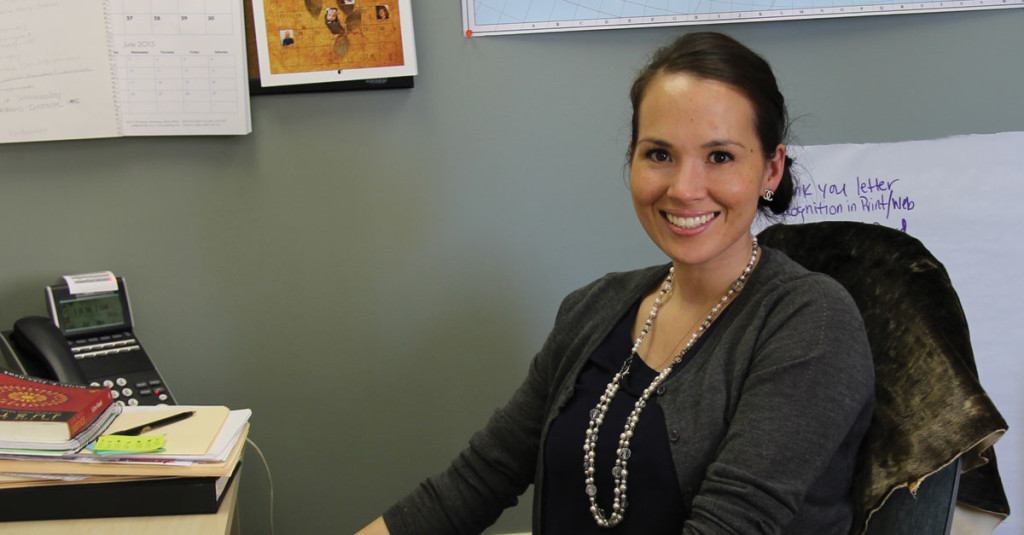
Storytelling is an important tool that has aided in the perpetuation of the Alaska Native peoples and their cultures for more than 10,000 years. If you ask Emily to tell you her story, she will begin with her grandmother, a beautiful Alaska Native woman who gave her mother up for adoption. Her mother was raised by a non-native couple and grew up estranged in body and spirit from her Yup’ik and Iñupiaq roots. So did Emily, who was born in Fairbanks but raised in Texas on the border of Mexico.
“Growing up I knew I was Alaska Native, but I didn’t really know what that meant,” Emily said. “But when my mom would put on her Native jewelry, I remember being strongly drawn to it.”
Unfortunately, parental alcoholism and constant mockery of her race and heritage made life in Texas challenging for Emily. Dysfunction and chaos ran rampant in her household. It seemed like the universe had finally cut Emily a break when she moved back to Alaska at the age of 19, fell in love with, and married, Jake Tyrrell.
But it didn’t.
Emily was widowed at the age of 23, leaving her to raise her and Jake’s 14-month-old daughter, Anya, on her own. With no life insurance, Emily had had to bury her late husband and go back to work within the space of a week. At the time, Emily did not have much in the way of a support system around her and so she was left to draw on whatever resources she could find inside herself to get through her ordeal and cope with her loss. For a long time, that wasn’t much, even after she moved from Fairbanks to Anchorage, where she had a close friend and found a job with the IBEW.
“I was just going through the motions,” she says. “I got up, I went to work, I came home and I cried myself to sleep. If this was her life, she wasn’t sure she wanted it. She admits she contemplated suicide.
Emily’s outlook and fortunes turned when she decided to go back to school at UAA, where she did exceedingly well and was soon receiving scholarships. An internship for Alyeska Pipeline Service Company (Alyeska) proved to be another turning point. There, she had the opportunity to take on projects that gave her more responsibility than many companies are willing to give their interns. To Emily, this one internship changed her life. For example, Tom Barrett, Alyeska President/CEO, advised her that if she wanted a “seat at the table” one day then she should consider getting her MBA. Without hesitation, Emily applied to APU and was accepted into the Executive MBA program. While pursuing her EMBA, she was working for the Pebble Partnership, which she credits with giving her valuable professional experience in a controversial arena. When she was laid off, the timing coincided with a course intensive at Danube University Krems in Austria, an exchange program that that was part of APU’s EMBA.
“I decided to stay in Europe for a month,” Emily says, taking advantage of the break the layoff gave her from work. Emily credits the exchange experience and her extended trip through Europe as giving her a broader view of the world and APU’s EMBA program for challenging her to new limits. Faculty encouraged her to develop skills and to understand areas of business that, on her own, she might not have been interested in doing. She cites spreadsheets as one example.
“I understand now why they’re important,” she says. “Data always tells a story.”
Emily will tell you in no uncertain terms that education changed her life and she has been blessed with excellent and supportive mentors, who recognized her talent. She draws strength from her faith in God and from her ancestors to get her through the rough spots.
“My Alaska Native culture has been my life raft,” she says. “Knowing that I have the blood of strong Alaska Native women running through my veins gives me hope, pride and a responsibility to help my community.”
Although she grew up in Texas, Emily is deeply connected to her Alaska Native roots today. She is proud to serve the entire Alaska Native community through her job at First Alaskans Institute. Her daughter, Anya, now nine, attends an Alaska Native charter school, where she’s learning Yup’ik. Emily is learning Yup’ik, too, and together, they practice the Pledge of Allegiance in the language of their heritage. Emily has taken on fundraising for her daughter’s school and been invited to head an Alaska Native chapter for UAA’s alumni association.
Recently, Emily took the GRE because there’s more school in her future and she’s preparing for the things she wants to accomplish next. She tells me that Anya watches what Emily is doing and tells Emily that she plans to have as many degrees as her mother, only faster and sooner.
“The other day we were carrying groceries into the house and I thought Anya might be trying to carry too much stuff,” Emily says. “But my daughter said to me ‘We’re Tyrrells, and we’re strong.’”
In his introduction to the 2008 edition of The Best American Short Stories, author Salman Rushdie writes that “the freedom to tell each other our stories of ourselves … is profoundly connected to the larger subject of freedom itself.” As I listened to Emily I was reminded that the power of storytelling in the lives of human beings cannot be overstated. Stories give us a power over life that we ourselves do not have. What is random and senseless can be made consistent and meaningful in the telling. Chaos can be brought to order, a victim can become a survivor and healing becomes possible. In telling where we have been and where we are going, our stories connect us to our past and they conjure our future. Our stories are about not only ourselves and our families, but about our people.
